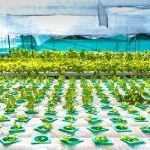Ponics VET Hydroponics
The Ponics VET project focuses on young farmers, or prospective ones to help create new skills in hydroponics. The idea is to provide them training in a new career that may form a key element in the future of sustainable agriculture.
Website
Country
Media
Useful links:
In the UK, Farm Urban run outreach programmes with schools and community groups to introduce people to high tech urban farming including hydroponics, edible walls and mushrooms - producing healthy food and developing transferable skills.
* TOP TIP *
'Compare hydroponic and conventional growing. Which one is better for the environment?'
How is the project linked to climate change and sustainability?
The countryside is very exposed to climate change, as farming activities directly depend on climatic conditions. Hydroculture has a key role to play in food provision and tackling global challenges such as water scarcity, food security, urbanisation and reductions in energy use and food miles. From a sustainability perspective, it deals with protecting natural resources (such as soil and water), feeding people with maximum energy efficiency and fighting against food insecurity.
Who is involved?
The project targets young farmers and prospective farmers in both rural and semi-urban communities. The group will include the following participants:
- 180 rural and semi-urban farmers will be interviewed for survey information
- 20 rural and semi-urban farmers involved in a pilot project
- Public offices and NGOs that promote sustainable agriculture will be included
- A network of training providers across Europe to provide training in the field of hydroponics
How are the participants involved?
The project provides an online e-learning course so students can learn about the principles and most recent hydroponic business innovations, especially around the green, circular and 'blue' (marine) economy. These new types of economic can also be integrated with its local community.
The participants will take part in the following topics on the e-learning course:
- Introduction to sustainable agriculture techniques and innovation for rural and semi-urban farmers;
- How to tackle soil sealing and the importance of hydroculture;
- Hydroponics and aquaponics techniques: basics on new hydroponics agriculture;
- How to create a cost-efficient system using hydroculture methodologies.
Key steps:
There will be many new opportunites for green careers in a more climate-friendly future. Schools and further education colleges can play a huge role in inspiring students to learn about these new technologies and develop their skills for the labour market. There are some key steps that educational establishments can consider to support this:
- develop practical and real-world learning opportunities for children so that they can be inspired by the topic of sustainability
- highlight jobs that may enable them to pursue a planet-friendly careers after school
- think about career advice so that pupils can be exposed to a wider range of jobs to help them choose further edcuation opportunities
- signpost to online and physical courses that can help develop the new skills and competancies required

